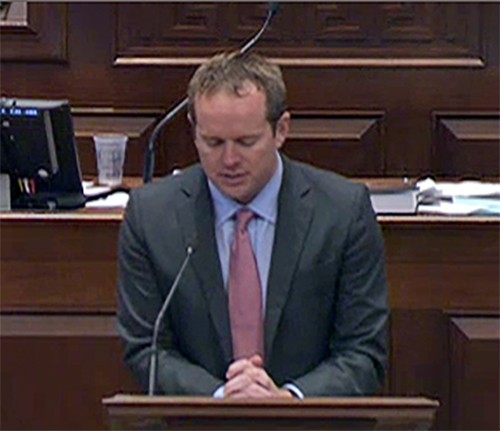
Durham in the dock of the House on Tuesday
The first of two important objectives of this week’s special session of the General Assembly was achieved in Nashville on Tuesday — the formal expulsion from the legislature of
accused sexual predator Jeremy Durham.
Technically, the action against Durham, achieved by a 70-2 House vote in favor of expulsion, was an add-on to the special session, which had been called by Governor Bill Haslam to amend a new state law that had raised permissible alcohol-level units from youthful drivers and threatened thereby to cause a loss of $62 million in federal funding.
But the Durham matter dominated public attention and was acted on first.
Durham, a Republican from suburban Franklin, had represented House District 65 but had already been overwhelmingly defeated in the August 4 primary election by political newcomer Sam Whitson after widespread publicity about improper behavior toward women working in Legislative Plaza, culminating in a state Attorney General’s report alleging 22 known cases.
That report had followed year-end disclosures in the Nashville Tennessean of untoward activity by Durham, resulting in his forced resignation from a position as GOP legislative whip and later in his ousting from their party caucus by House Republicans, after the House’s minority Democrats and state Democratic Party chair Mary Mancini had begun making Durham something of a negative cause célèbre.
In particular, Republican House Speaker Beth Harwell, under persistent challenge by the Democrats for alleged inaction, assumed an increasingly aggressive posture toward Durham and, after public circulation of the AG’s report, banished Durham from Legislative Plaza except during actual sessions, removed his office to an adjoining building, and prohibited any interactions of his with female staffers without third-person supervision.
Meanwhile, Governor Haslam, state Senate Speaker Ron Ramsey, and other leading Republicans joined Harwell in calling for Durham to resign from the legislature.
Not even Durham’s defeat by Whitson quelled the furor, inasmuch as the defeated one-term representative still remained eligible for a modest annual state pension. That fact was the proximate reason for the expulsion action, which GOP state representative Susan Lynn of Mt. Juliet announced that she intended to introduce on the special session’s first day.
Somewhat unexpectedly on that first day, various Democratic House members, including Memphians G.A. Hardaway and Larry Miller, joined Republican Rick Womick in raising objections to the expulsion process, based on various procedural issues and a professed concern for due process.
From the Democrats’ point of view, that was a strategy designed to prolong discussion of the Durham matter — and the consequent embarrassment to Republicans, whom Democrats intended to charge with negligent oversight and early attempts to suppress awareness of Durham’s derelictions. The strategy was amended overnight, however, as public reaction to it seemed clearly averse.
On the second day, key Democrats like caucus chair Mike Stewart of Nashville joined with Republicans in making something of a prosecutorial attack on Durham, who made an effort, for at least the first hour of the Tuesday session, to defend himself, though without specifics and without offering credible reasons why he had failed to offer evidence in his own defense during the Attorney General’s investigation.
State Rep. Johnnie Turner of Memphis provided one of the signal moments of Tuesday’s session — and a turning point of sorts — when she eloquently contrasted the plight of Durham’s female victims with what had been abstract debate about legal niceties and the format of the expulsion process.
Though there were a fair number of absentees from the expulsion vote and several members abstained from voting, Durham in the end had only two votes against his expulsion — Republicans Courtney Rogers of Goodlettsville and Terri Lynn Weaver of Lancaster — and the 70 votes to expel him were four more than the two-thirds figure of 66 needed.
In apparent anticipation of the result, Durham had already departed the chamber and the Capitol building. His chapter of the special session was over — along, it would seem, with his public career.